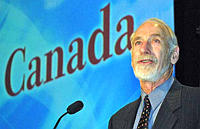| Global warming about to get
ugly
Anderson warns of serious effects

Peter Parsons / Herald Photo
Federal
Environment Minister David Anderson speaks about global
warming during an appearance Tuesday at the Bedford
Institute of Oceanography in Dartmouth.
| By Lois Legge / Staff
Reporter
Disease, insect invasion, storm surges that devastate
coastal communities and air pollution so thick that children
may not be able to play outside.
This may sound like a science-fiction movie.
But real scientists are predicting that the scenario could
be part of the world's future if countries don't curb
greenhouse gas emissions, federal Environment Minister David
Anderson said Tuesday in Dartmouth.
Mr. Anderson was speaking at Bedford Institute of
Oceanography during a national tour to increase awareness
about global warming, believed to be caused by greenhouse
gases that are mainly produced by burning fossil fuels.
Climate change has already affected Atlantic Canada,
causing coastal bluffs to retreat as much as 12 metres in a
year, he said.
Mr. Anderson said studies show things will get worse if
governments, businesses and individuals don't address the
problem.
A government fact sheet shows average summertime
temperatures in the Atlantic region could increase by as much
as four degrees Celsius over the next 80 years, causing oceans
to expand and sea levels to rise.
Such levels would cause more flooding along coastal
communities and disturb the habitats and life cycles of marine
life, birds and other wildlife.
Mr. Anderson said warmer ocean temperatures would disrupt
the fisheries, too, causing shifts in species' distribution
and migration patterns.
"Since fish sizes change with water temperature, there will
be variation in the growth rates of some species," he said.
"We also expect changes in the ratio of deep-sea to groundfish
abundance."
Mr. Anderson said studies, though still inconclusive, show
there could be lower sustainable fish harvests in the Atlantic
region.
Atlantic Canadian forests would be more susceptible to fire
and insects, and more trees would be felled as storms
intensified.
Canada is among more than 150 countries to sign the 1997
Kyoto protocol on reducing greenhouse gas emissions, but the
government hasn't ratified the agreement, which commits
countries to reducing emissions by six per cent below 1990
levels by 2012.
In Canada's case that amounts to a reduction of about 240
megatonnes of carbon dioxide.
Mr. Anderson said Prime Minister Jean Chretien has "talked
of 2002 as being the year that he would like to see a decision
made."
The government has budgeted hundreds of millions of dollars
to reduce emissions, but he said Ottawa wants to consult with
all territories, provinces, affected industries and the public
before ratification.
The minister said the government also wants to ensure no
region will be unfairly penalized by reduction targets.
But Mr. Anderson said governments can't tackle the problem
without co-operation from individuals.
"The average Canadian can do a tremendous amount," he later
told reporters. "They're each responsible for about six tonnes
of greenhouse gas emissions." Mr. Anderson said simple
lifestyle changes - not using cars for short trips, turning
off lights when they're not needed and buying more
energy-efficient vehicles - can all have a substantial impact.
|